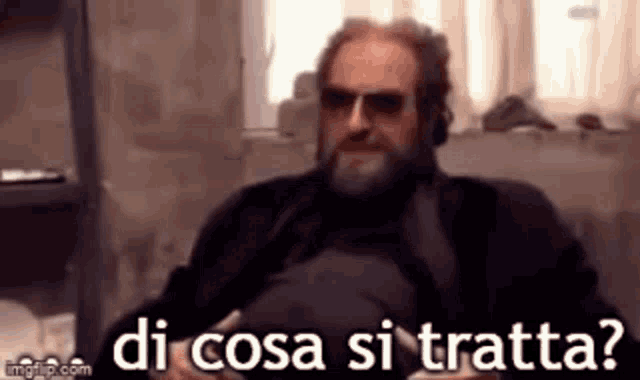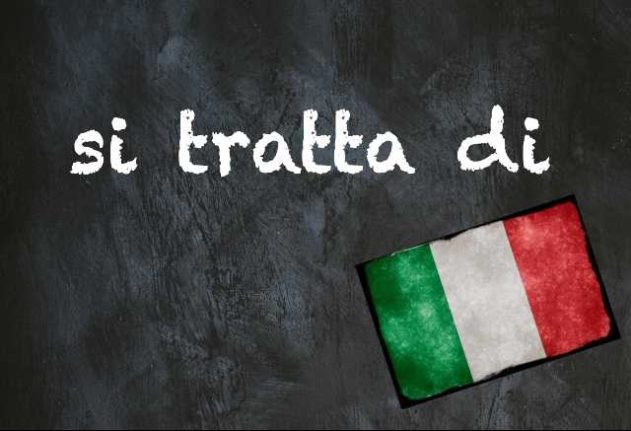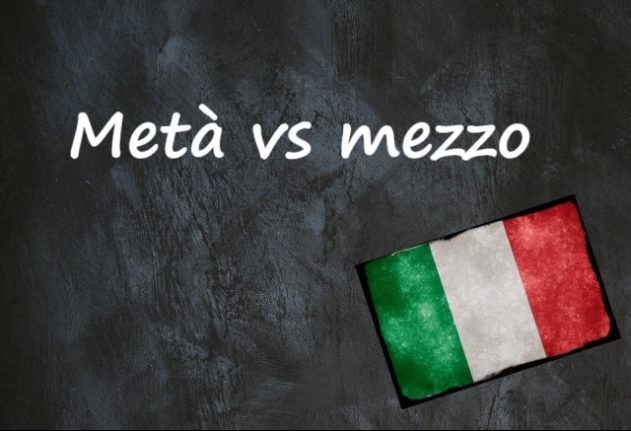Today’s expression is one you’ll hear a lot in spoken Italian.
It’s also a tricky one for anglophones to wrap our heads around, because although it appears simple – ‘si tratta di’ basically means something along the lines of ‘it concerns/discusses/deals with/is about’ – it actually doesn’t translate very cleanly into English most of the time.
Let’s start with the use that’s easiest for us to grasp: asking and answering the question of what something’s about/what it concerns.
– Pronto, sono l’ispettore Jackson, posso parlare con la signora Hoffman?
– Sì, sono io – posso chiedere di cosa si tratta?
– Hello, this is Inspector Jackson speaking, can I speak with Mrs. Hoffman?
– Yes, this is she – may I ask what this is concerning?

We can also use the phrase to say that something is ‘a matter of’ or ‘a question of’:
Se si tratta di qualche ora, rimarremo qui ad aspettarla.
If it’s a question of hours, we’ll stay here and wait for her.
Ora si tratta solo di scoprire dove ha lasciato le chiavi.
Now it’s a just a matter of figuring out where she left the keys.
And si tratta di can also be as a translation for ‘when it comes to’.
Adoro mangiare bene, ma quando si tratta di cucinare sono una frana.
I love eating well, but when it comes to cooking I suck.
Where things start to get a bit more complicated is that you’ll often see the phrase used where the English translation doesn’t require anything.
For example, you might hear the following exchange at work:
– Michela non viene al lavoro oggi perché la sua bambina è malata.
– Spero che non si tratti di nulla di grave.
– Michela’s not coming into work today because her little girl’s sick.
– I hope it’s nothing serious.
You could say ‘I hope it doesn’t consist of anything serious’, which would get you closer to a direct translation – but in English this would sound oddly formal and overblown (in the above example we use tratti rather than tratta because spero che requires the subjunctive).
What if you want to say that a certain thing – a song, a book, a film, a speech – discusses or ‘deals with’ certain themes or issues?
You can say, for example, ‘Il suo terzo libro tratta delle idee di pressione sociale e di libertà personale‘ – ‘her third book deals with ideas of societal pressure and personal freedom.’
Or you can say, ‘Nel suo terzo libro, si tratta delle idee di pressione sociale e di libertà personale‘ – ‘In her third book, she discusses ideas of societal pressure and personal freedom” (a more literal translation would be ‘in her third book, ideas of societal pressure and personal freedom are discussed’, which sounds a bit awkward in English).
You could ask:
Di cosa tratta il libro?
What does the book discuss?
or
Di cosa si tratta nel libro?
What’s discussed in the book?
What you can’t do is say, ‘Il libro si tratta di…’ or ask ‘Di cosa si tratta il libro?’. Neither of these constructions work because you can’t have both the impersonal si and the subject (in this case, il libro) together.
What if you want to say, for example, ‘the book/film is about…’?
The easiest way to do that is either to just say ‘il film parla di…‘ – ‘the film talks about…’ ; or ‘il film racconta la storia di…’ – ‘the film tells the story of…’:
Il libro racconta la storia di un ragazzo che scopre di essere un mago.
The book tells the story of a boy who discovers he’s a wizard.
Hopefully now you have a better idea of what this phrase is all about!
Do you have an Italian word you’d like us to feature? If so, please email us with your suggestion.
Don’t miss any of our Italian words and expressions of the day by downloading our app (available on Apple and Android) and then selecting the Italian Word of the Day in your Notification options via the User button.



 Please whitelist us to continue reading.
Please whitelist us to continue reading.
I appreciate your piece on “si tratta di.” However, I was VERY pleased to also learn how to express when “I suck” at something. Google translate uses: “faccio schifo.” I’d be interested in the difference, and if – as is often the case – Google misstates the situation. Grazie!